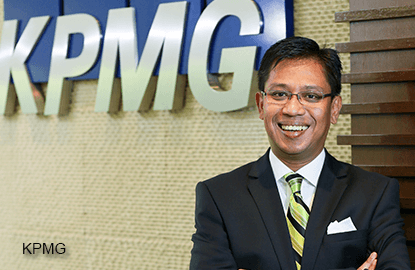
KUALA LUMPUR (July 22): Chief executive officers (CEOs) of global businesses have grown more confident about growth of both their companies and the global economy over the next three years than they were last year, a new study by KPMG International has shown.
The survey of 1,278 CEOs in 10 key markets and nine key industry sectors also found CEOs globally are set to hire, with 78% of respondents indicating they are expecting to be in hiring mode through mid-2018.
The sectors comprised automotive, banking, insurance, investment management, healthcare, manufacturing, technology, retail/consumer markets and energy/utilities.
According to the 2015 KPMG CEO Outlook Study released today, 69% of CEOs in Europe, 66% in Asia-Pacific and 52% in the US indicated they are more confident than they were last year about the prospects for the global economy in the next three years.
In assessing their own company’s growth prospects, 70% of European CEOs, 68% of Asia-Pacific CEOs and 19% of US CEOs indicated they are more confident than a year ago.
"There is a more positive change in confidence versus 2014 in Europe and Asia, compared with the US, which is in part reflective of the US being in a more advanced stage of the economic recovery," said KPMG International global chairman John Veihmeyer in the statement.
The study also showed 44% of the CEOs are only ‘somewhat comfortable’ with their current business model, with 29% of leaders saying their organisations are likely to be transformed into significantly different entities in the next three years.
However, almost one-third of CEOs say their business is not taking enough risk with their global growth strategy, and more than half (56%) said they have not fully implemented a company-wide process for innovation.
“CEOs continue to confront business challenges of unprecedented complexity,” said Veihmeyer.
“Many CEOs in our study have repeated what I am hearing when I meet with business leaders — that they need to take more calculated risks with their growth strategies. They know that they are going to have to have to do things differently, and they are looking hard at their organisations to determine how they can transform to stay relevant and strengthen their competitive positions," he added.
“New competitors and business models, changing customer demands and the potential for market disruption, these are some of the barrage of challenges that CEOs are facing,” said KPMG managing partner for Malaysia, Datuk Johan Idris.
“However, Asean is enjoying a golden period as the region’s robust growth rates and 600 million consumers capture the world’s attention, and multinationals are rightly recalibrating their regional strategies.
"At KPMG, we have seen a significant shift in the balance of economic power from mature markets to high growth emerging markets. We have seen this shift become an integral part of organizations’ strategy for achieving profitable growth," he added.
When asked whether their primary focus would be on growth or operational efficiency over the next three years, 94% of US CEOs cited growth, while their Asian and European counterparts said they were focused on operational efficiency.
In terms of issues having the greatest impact on their company’s prospects and performance, the top three issues identified by CEOs were ‘global economic growth,’ followed closely by the ‘regulatory environment,’ and ‘disruptive technology.’
Half of respondents noted additional challenges with how their business needs to improve the way it manages data and analytics, and how they need to do more to prepare for a cyber-security event.
“Finding areas of potential cost reduction is about looking at historical data and benchmarking your cost structure to find savings and anomalies, whereas identifying new growth opportunities and productivity improvements requires organizations to be more predictive in the way they use and interpret their data," said Johan.
"At the end of the day, growth and productivity are about adding value to the organisation, something that data and analytics excels at. Today, it is clear that industry sectors now understand that data and analytics will be a game changer,” he added.
The survey also found that 52% of the CEOs say their current growth strategies are built primarily around organic growth, with 42% saying it is a combination of organic and inorganic growth through acquisitions, and 6% saying it’s primarily inorganic.
When asked to consider their anticipated growth strategies over the next three years, 59% of CEOs expect their priority will be organic growth, 22% indicated an even split between organic and inorganic growth through acquisitions, and 19% say it will be through inorganic growth.
“CEOs are realising that they must enter new frontier markets now, or risk being left out of the economic gains. There is an increasing appetite to invest in the dynamic economies of Asean (such as Indonesia, Malaysia and Myanmar), as well as other frontier markets across the globe, to create strategic corridors to new markets.
"Savvy CEOs develop strategies to identify top drivers of success and these include blending local and head office leadership, adapting the business model, focusing on talent acquisition and retention, and having a proper corporate governance eco-system as main growth drivers," said Johan.